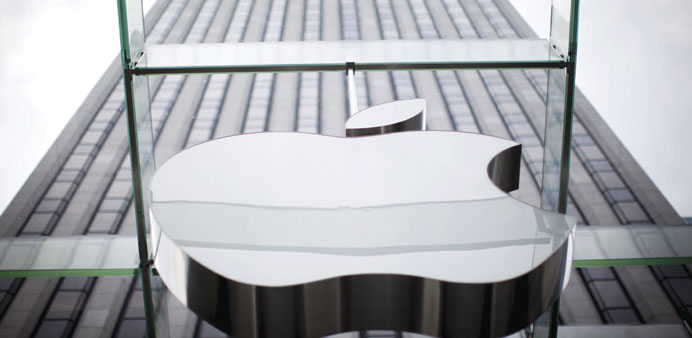A logo hangs above the entrance to the Apple store on 5th Avenue in the Manhattan borough of New York City. The additional $180mn Apple seeks is based on a product-by-product calculation for five devices Samsung sold infringing Apple patents.
Bloomberg
San Francisco
Apple asked a US judge to award it about $180mn more in its long-running smartphone patent war with Samsung Electronics.
The request follows a $548mn judgment that the Korean handset maker paid this month. Two weeks later, Samsung asked the US Supreme Court to overturn the bulk of the award in what would be the court’s first case involving design patents in 120 years.
The additional $180mn is based on a product-by-product calculation for five devices Samsung sold after a federal court jury in San Jose, California, found in August 2012 that the Galaxy maker had infringed Apple patents.
Apple says it’s owed supplemental damages for continued infringement, plus interest, according to a court filing on Wednesday.
Danielle Meister Cohen, a spokeswoman for Samsung, didn’t immediately respond after regular business hours to an e-mail seeking comment on Apple’s filing.
Samsung is asking the Supreme Court to consider the scope of design patents and how damages are calculated in such cases. The company is challenging an appeals court ruling that Samsung had infringed the design patents and that the law entitles Apple to a cut of Samsung’s total profits from smartphones that used patented designs.
Meanwhile, Apple is set launch its payment service in China as soon as 2016, pitting it against entrenched Chinese rivals Alibaba Group Holding and Tencent Holdings.
Apple will partner with China’s main bank card and payment firm UnionPay, a state-controlled consortium that has a monopoly on all yuan payment cards issued and used in the country.
The move will see Apple Pay take on Tencent’s WeChat Payment and Alipay, the crown jewel of ecommerce king Alibaba’s affiliate Ant Financial, the top player in China’s fast-growing online payments market.
Eddy Cue, Apple’s senior vice-president of Internet software and services, said the tie-up with UnionPay and leading local banks would help Apple Pay give Chinese shoppers a “convenient, private and secure payment” option. “China is an extremely important market for Apple,” he said.
China, the world’s second-largest economy, is one of Apple’s most important markets for iPhone and tablet sales, but until now the firm has been kept out of its online payments market.
Online transactions are booming in China, boosted by the proliferation of hundreds of millions of smartphones that are being used for everything from paying for taxis and meals to buying goods at High Street stores.
In July, China proposed regulations to shake up the online payment services sector, where companies which own payment systems can reap huge profits by charging transaction fees.
UnionPay said in a statement it also planned to tie up with Samsung Electronics’ payment system, Samsung Pay, which was launched earlier this year.

